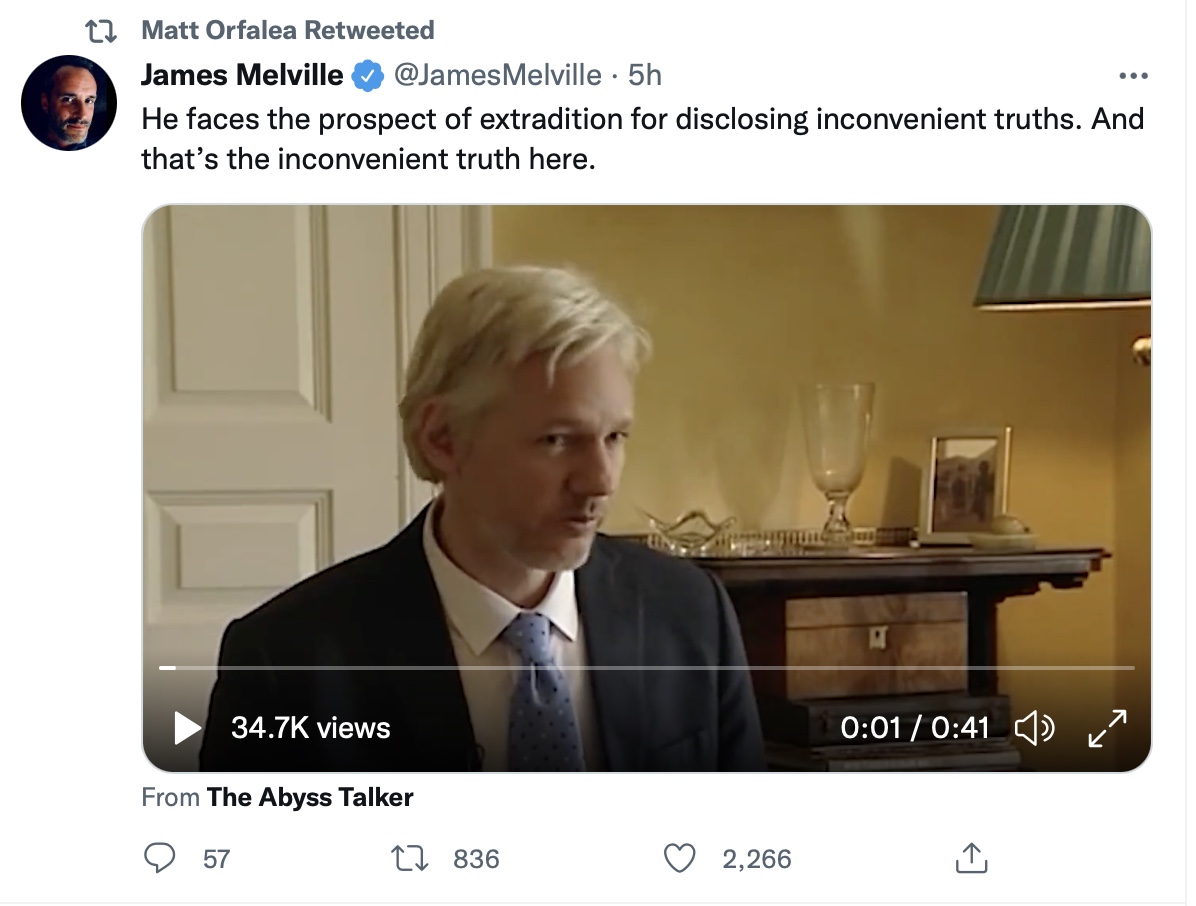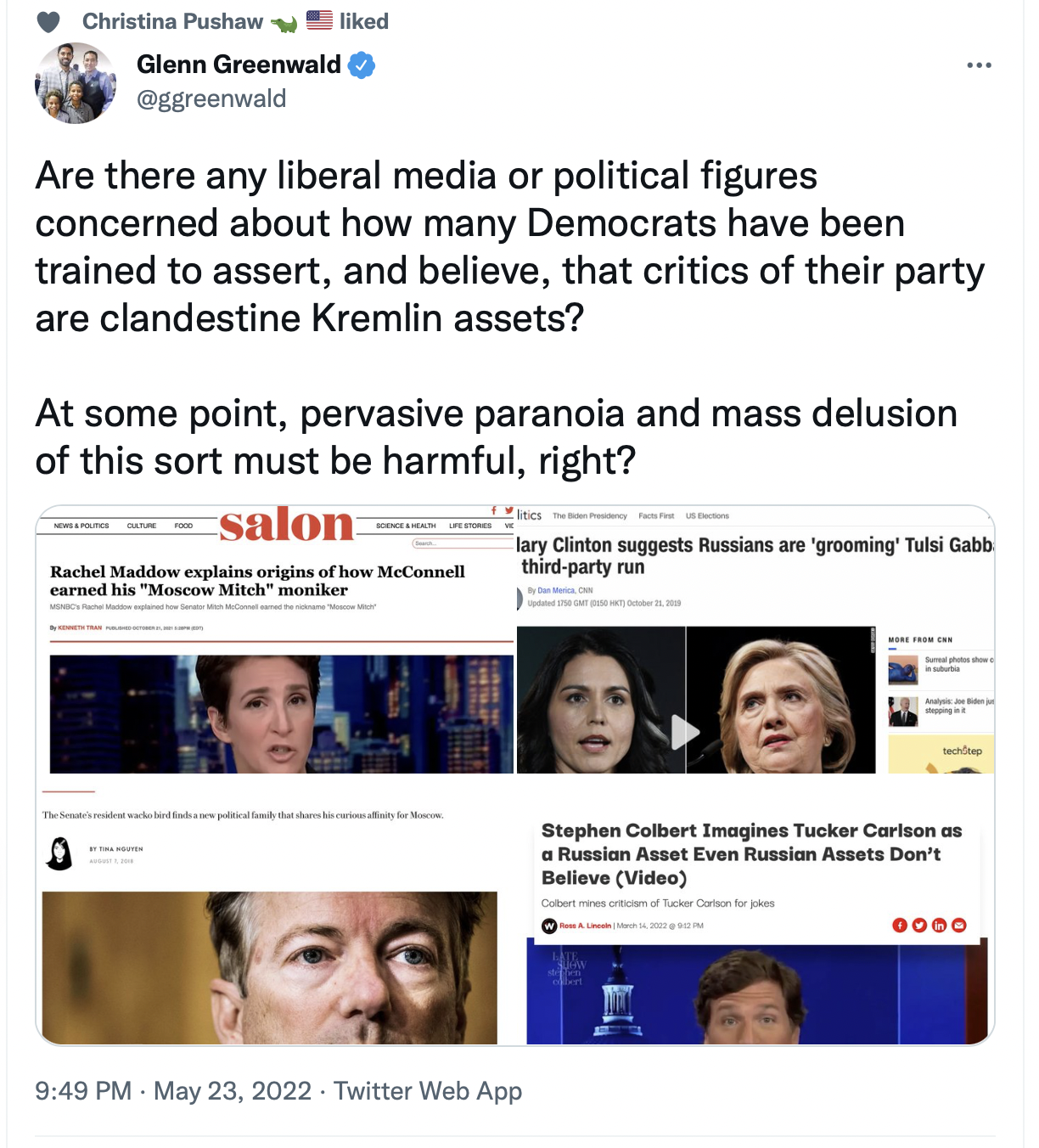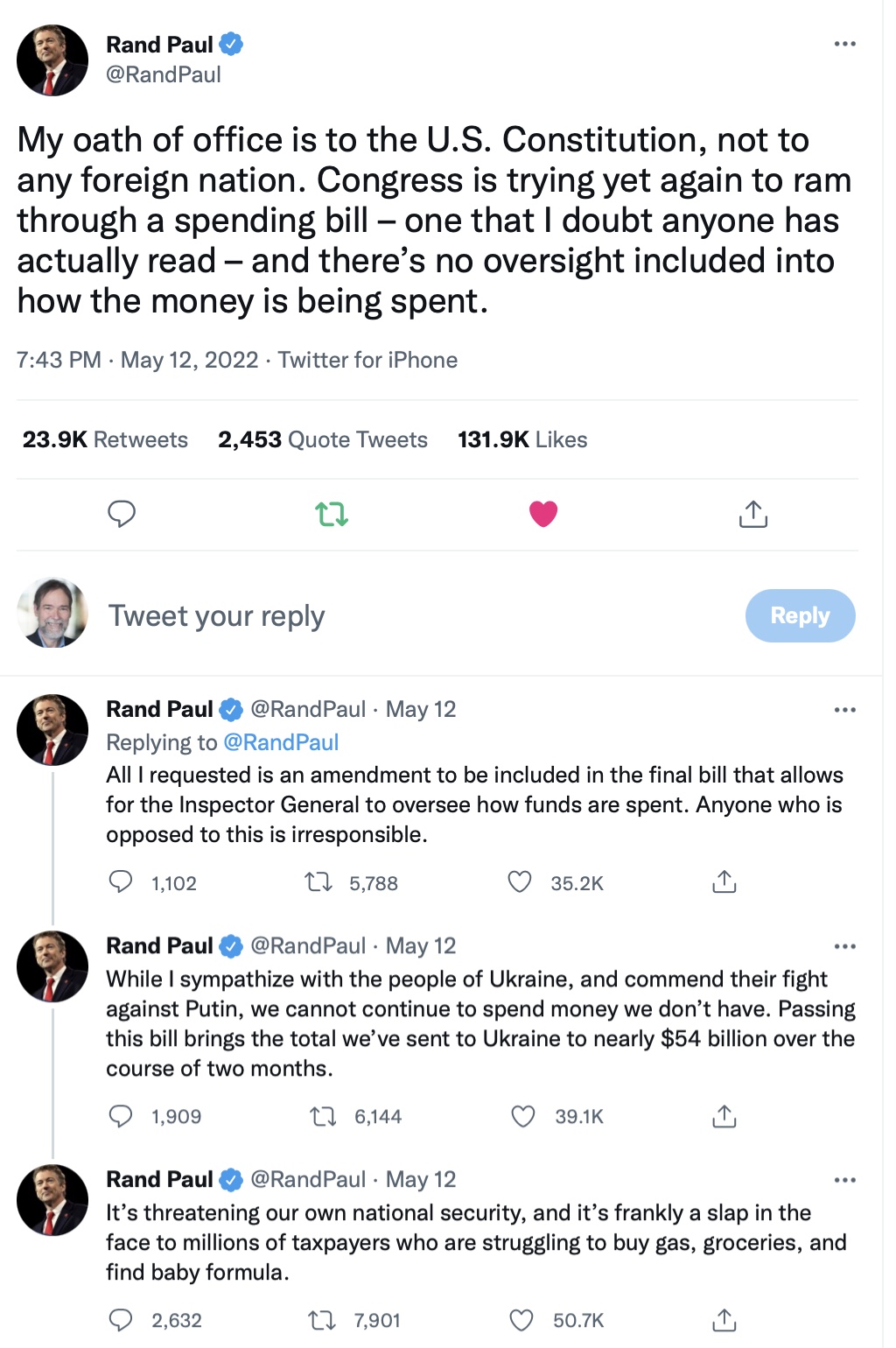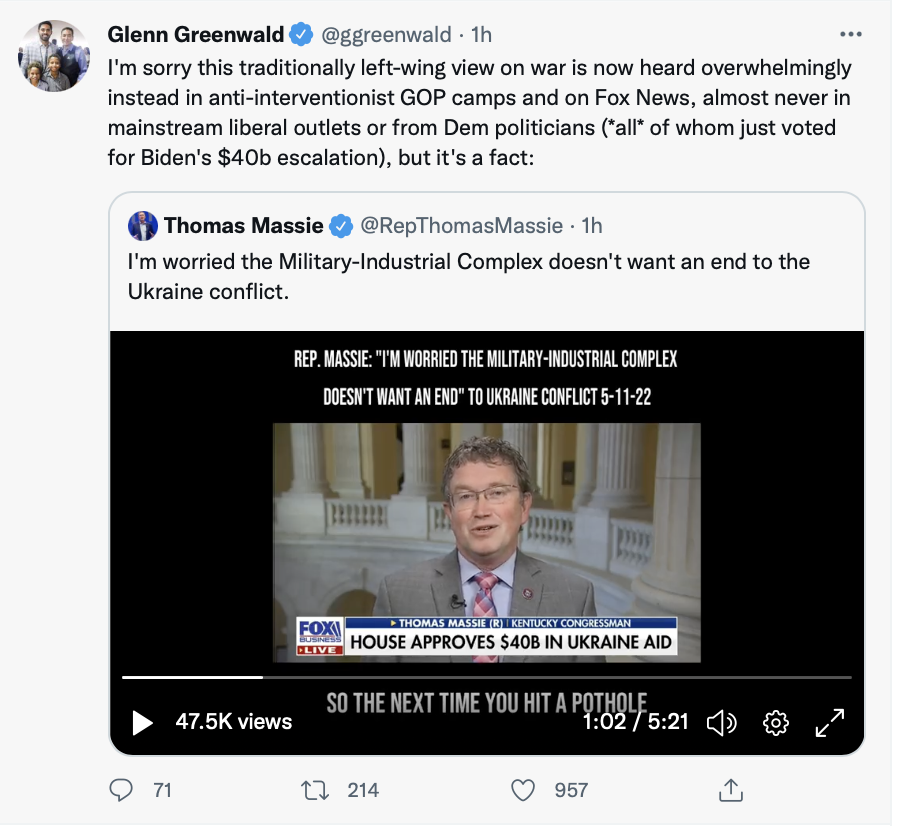Name-Calling in Lieu of Meaningful Conversations
Name-calling. That's apparently what a political party does when it has largely abandoned the working class in order to feast on large corporate contributions. What else could we have done with $40 billion? This downpayment on this illegal war has cost each American taxpayer almost $300. What if we had given $1 Billion dollars to each of the 40 American cities that are most crime-ridden and/or lacking in education funds? There wasn't even a God-damned debate about this largess to America's biggest defense contractors. Most of us who have challenged this profligate spending for this extremely dangerous war have been called "Russian assets." As if the apparent U.S. strategy of regime-change against Putin, a purported madman with thousands of nuclear missiles, doesn't deserve sober debate. As though we have already forgotten how devastating it is to our own country to fight another undeclared war without any meaningful end game. That is the state of democracy in the modern day U.S. This is what passes for meaningful conversation. Name-calling.
Needing More War News, NBC Analyzes Impending War with China
Here's the military-industrial-news-media complex hard at work today, focused on the western flank. I'm smelling the stink of military manufacturers frightening and corrupting politicians in order to procure more orders for weapons. And why not float the idea of a two-front war with two nuclear armed adversaries, one of whom manufactures much of America's high tech goods? Trump is mostly out of the news these days than to drum up more warmongering? This will allow NBC to sell more commercials and thus enjoy some largess too.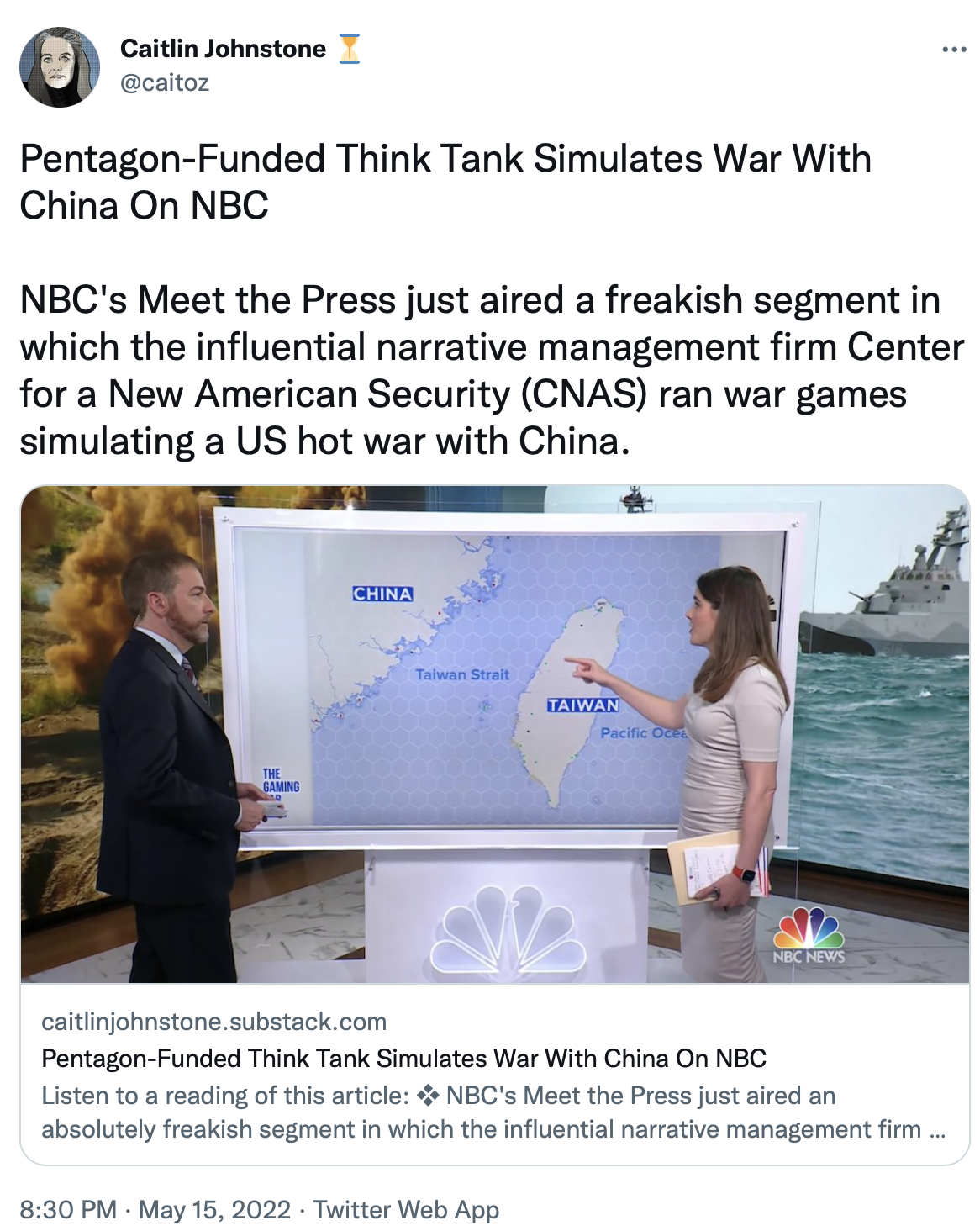
Caitlin Johnson comments at her website:
NBC's Meet the Press just aired an absolutely freakish segment in which the influential narrative management firm Center for a New American Security (CNAS) ran war games simulating a direct US hot war with China. . . .
As we've discussed previously, citing war machine-funded think tanks as expert analysis without even disclosing their financial conflict of interest is plainly journalistic malpractice. But it happens all the time in the mass media anyway, because the mass media exist to circulate propaganda, not journalism.
This is getting so, so crazy. That the mass media are now openly teaming up with war machine think tanks to begin seeding the normalization of a hot war with China into the minds of the public indicates that the propaganda campaign to manufacture consent for the US-centralized empire's final Hail Mary grab at unipolar domination is escalating even further. The mass-scale psychological manipulation is getting more and more overt and more and more shameless.
Congress is Pollyannaish on War
Who could possibly be against financial oversight? And what about additional oversight into how this mountain of weapons will be used next year or five years from now, and against whom? At a time of skyrocketing inflation, Congress wants to spend money that we will be forced to borrow or print out of thin air based on sloganeering, but it is afraid to ask hard questions in public. If I took out a car loan today, I would be asked a hell of a lot more questions then Congress is asking itself.
Over this century, we have a clear track record for coddling our military contractors, pouring weapons and military into conflicts that have little to do with American interests in the absence of any metric of success, eventually slinking out of that shattered country, having depleted our treasury, thereby permanently losing opportunities to address the needs of our own citizens. Has anyone considered how angry we were when we (falsely) accused the Russians of offering bounty for the killing of US troops in Afghanistan? Our leaders are now bragging that they were instrumental in killing a dozen Russian Generals and sinking a Russian warship. Why would we not think that there will be blowback to this, perhaps in the form of Russian funding of terrorist acts against the US or in the form of nuclear annihilation? Why won't Congress discuss any of these issues in public?
When it Comes to an Extremely Tight National Budget, War Always Finds a Way
The $54B being shoveled over to Ukraine as part our proxy war against Russia is the equivalent of the entire annual U.S. budget for roads and bridges. It's double the annual budget of NASA. Every Democrat in Congress voted for this give-away, mostly to the U.S. military-industrial complex. Those voting for this include all six members of the Squad, allegedly the most progressive wing of the Democrat party. Not a single no vote from Democrats. Most Republicans joined in, with no meaningful discussion of U.S. priorities, no acknowledgment that the U.S. was not being threatened by Russia. No acknowledgment that the country NATO was designed to defend no longer exists and no accountability as to how these weapons will be used in coming years and by whom. This $ is pouring out of our deficit-rampaged national budget in a country where schools are failing, where cities are decaying, where crime has skyrocketed since 2020 and where it is difficult to buy infant formula. This is America at its shining best, in the eyes of our defense industry.
- Go to the previous page
- 1
- …
- 19
- 20
- 21
- 22
- 23
- 24
- 25
- …
- 49
- Go to the next page

